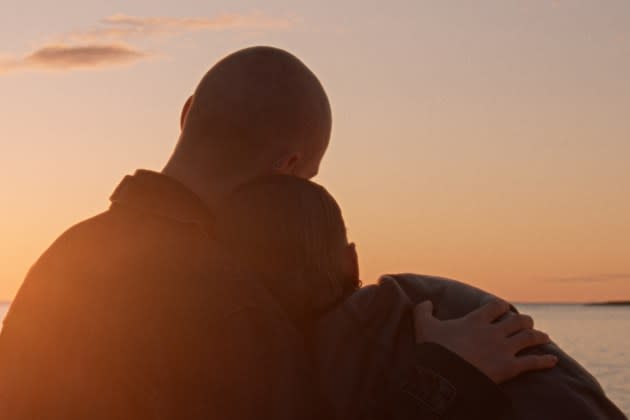‘When The Light Breaks’ Review: Rúnar Rúnarsson’s Original And Specific Vision Of Grief – Cannes Film Festival
- Oops!Something went wrong.Please try again later.
- Oops!Something went wrong.Please try again later.

In our first encounter with Una (Elín Hall) and Diddi (Baldur Einarsson) in the long dusk of a Reykjavik spring night, they are thinking only of the future. The immediate future: will they be able to sleep overnight together without Diddi’s flatmate noticing? The near future, meaning the next couple of days, when Diddi officially breaks off his longstanding relationship with his high-school sweetheart Klara and starts a new life with Una. And the long term. A trip to Japan. A different life with a wider scope than Iceland can provide. “Should we make babies?” Diddi murmurs into Una’s ear as they lie, wrapped around each other like kittens, in his single-pillowed bed.
But when Diddi is killed in a freak fire in a road tunnel the next morning – a national disaster that claims upwards of a dozen lives – Una finds herself alone with her searing grief. Diddi’s friends fly in to check hospitals and records; people she has never met, but who have known him all their lives. Klara (Katla Njálsdóttir) is there, a dead ringer for Una and recognized as the officially bereaved. The friends hug each other. These people own his past which, given that Diddi now has no future, means they own him.
More from Deadline
RELATED: Cannes Palme d’Or Winners: Photos From Every One Of The Festival’s Top Films Through The Years
It’s understandable. There were only five of them in the 10th grade in their tiny country high school, Diddi’s old schoolmate Siggi (Gunna Hrafn Kristjánsson) tells her. It is an immediately recognizable but unfathomable bond.
Una is an oddball in her way, a “pan-sexual” who dresses in men’s clothes, but she is not so against convention that she would break Klara’s heart with the truth. Instead, she tells herself she is the real widow and bites her tongue. These two women give remarkable, sensitive performances; they are perfect foils for each other. Klara is cow-eyed, flattened by sadness, fleshy where Una is lithe, a bit of a country bumpkin. Klara is not, however, any kind of fool.
Rúnar Rúnarsson established his field of endeavor with his first feature Volcano in 2011; this is his fourth. He tells stories of the Icelandic young, their prickly family relationships in isolated communities, small but pungent aspirations, emotions writ large against a towering landscape. As the title of his new film suggests, his chief raw material here is light. Although much of the story takes place inside, he finds places with vast windows, views to trees or the sea, stonework that refracts the sun’s rays or carves the world into small pieces of glittering pale sky seen through glass segments. In a film set largely in institutional interiors, there isn’t a dull shot.
Whenever he can, he takes us outdoors, showing the sun descend to the horizon while casting its empty spotlight across the waves. At times – when skipping us over the sea or taking us through the doomed tunnel – the light becomes an abstraction, heightened by the soaring voices of boy choirs that he already used to powerful effect in his 2015 film Sparrows.
There is a sense of living under a great canopy of light, with roofs an insignificant interruption. Going to find out if Diddi is one of the dead, talking about him, celebrating him – all within a space of 24 hours – is the story’s busywork, but it is overarched by the transcendent.
That said, Rúnarsson has kept his ambitions small; his canvas is limited, his narrative spare – so spare, indeed, that it sometimes drags. Within his self-imposed limitations, however, he draws a portrait of muffled grief that feels true and poignant. The reflective pairing of the two young women, emphasized by a visually inventive moment when their images merge in a window where one is seen through the glass and the other as a reflection, recalls the existential ambiguity of Bergman’s Persona. Una feels more than she can say; Klara knows more. Their silence communicates volumes; their shared pain is so thick you could run your hands through it. Somehow, they will find their way through silence to accommodate each other.
As an opening-night choice for Cannes’ Un Certain Regard, When the Light Breaks sets a standard for the original and specific vision that is expected of films in this section. Whether its heavy-hearted melancholy will be a hallmark of the sidebar itself will be revealed over the next 12 days.
Title: When The Light Breaks (Ljósbrot)
Festival: Cannes (Un Certain Regard)
Director-screenwriter: Rúnar Rúnarsson
Cast: Elín Hall, Katla Njálsdóttir, Ágúst Wigum, Mikael Kaaber, Baldur Einarsson, Gunna Hrafn Kristjánsson
Sales agent: The Party Film Sales
Running time: 1 hr 22 min
Best of Deadline
Broadway Spring 2024: Sufjan Stevens ‘Illinoise’ & All Of Deadline’s Reviews
Berlin Film Festival 2024: Award Ceremony, Film Premieres & Red Carpet Gallery
Sundance Film Festival 2024 Photos: Award Ceremony, Film Premieres & Parties Gallery
Sign up for Deadline's Newsletter. For the latest news, follow us on Facebook, Twitter, and Instagram.

